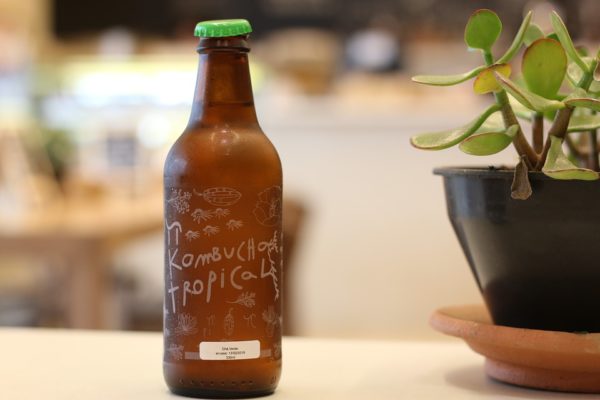Kombucha has recently become a popular drink in the health food scene in the United States, but it has existed elsewhere for thousands of years. It first appeared in China, then spread to Russia and Japan, and finally Europe in the 20th century. Ancient claims included cures for indigestion, hemorrhoids, and rheumatism, and data from World War II even suggests that individuals in countries who regularly consumed kombucha had lower rates of cancer. Modern proponents claim it can alleviate hair loss, boost the immune system, and aid in the prevention of weight loss, heart disease, and high blood pressure.
What’s in this seemingly magical cure-all? Kombucha is simply fermented tea, usually black or green, which is sweetened with sugar to feed the bacteria and yeast that create its distinct carbonated finish. The fermentation process also produces vinegar and B vitamins.
Image Source: esemelwe
There is some evidence that the drink can provide probiotic benefits, such as aiding digestion and supporting immunity. It also has all of the same antioxidant and anti-inflammatory properties as normally brewed tea. In animals, kombucha has been shown to lower blood pressure and cholesterol, but this result has not been replicated in humans.
Kombucha has a dark underside that is often ignored by health blogs and social media but has been exposed by scientific studies, such as Greenwalt’s comprehensive review in 2002. While the specific bacteria strains cultured are generally kept under control by the acid content, the yeast cultures are highly variable between batches. If the brewing and fermentation process is not completely sterile, mold can easily grow alongside the desired microbes. Also, if the fermentation time is not tightly monitored, the acidity of the tea can reach levels high enough to cause acidosis, dangerous acidification of the blood. Subsequently, the tea should not be consumed by people who are immunocompromised or have pre-existing conditions that make them more susceptible to acidosis, such as diabetes. Furthermore, both historical and modern anecdotal reports have associated stomach upset, allergic reactions, infections, and liver problems with drinking kombucha.
Image Source: Chad Springer
Home-brewing is very highly discouraged, as it is extremely difficult to ensure proper sanitation and test for mold, harmful bacteria, and high acidity. Commercially-produced kombucha is not likely to be harmful, but there is still a risk of contamination if all steps of production are not rigorously monitored. All of the scientifically-verified health benefits of kombucha can also be gained from non-fermented tea or other probiotic-containing foods. It may be best to substitute foods, such as yogurt or fermented foods like sauerkraut and kimchee, for kombucha until there is more conclusive evidence on its safety.
Featured Image Source: LyraSid










